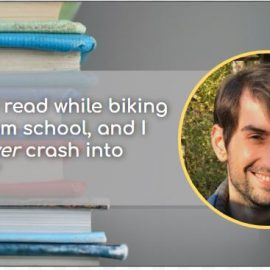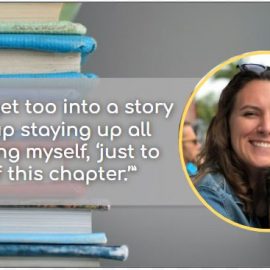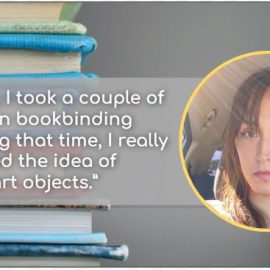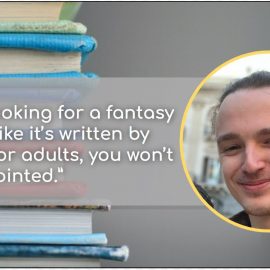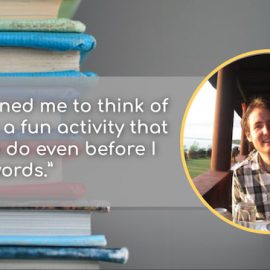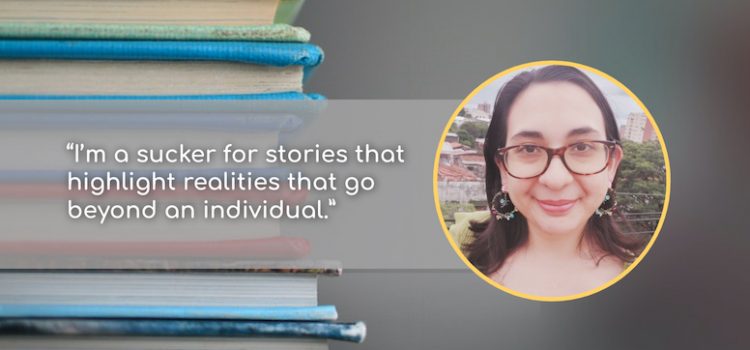
What book confronts the darkness and light that humanity is capable of? What book is sure to come up in a conversation one day? What book sings to its readers?
Majo could tell you. Based in Paraguay, she’s a book guide writer and a copywriter at Shortform. We interviewed her recently to learn a bit about her lifetime of reading.
Our Interview With Majo
The first book Majo ever read was about a dog that spent the night in a supermarket. The most recent book she read was a novel about African-American history. Here’s our interview with Majo, covering her first and last books—and several in between.
What kind of work do you do at Shortform?
I write guides for the content team and support the social media team with copywriting.
What’s your favorite book and why?
My answer to this question changes every time someone asks me! But, I think some of my all-time favorites include A Moveable Feast, The God of Small Things, and A Writer’s Diary by Virginia Woolf.
What are you reading these days?
The most recent book I read was Jazz by Toni Morrison. Right now, I’m reading Purge by Sofi Oksanen. Next on my list are lots of parenting books!
If you could have a dinner party with any three authors—dead or alive—who would they be and why?
Oscar Wilde, Ernest Hemingway, and Chinua Achebe. I think each of their writing styles is so distinct that I’d love to hear what they’d say about each other’s work. And, let’s be real, Oscar Wilde would make sure to keep the whole evening entertaining.
What’s your favorite genre? Why does it intrigue you?
Historical fiction. I love traveling back in time and imagining what I would’ve done if I’d been there.
Are there any book genres or tropes that you dislike or refuse to read?
I don’t love self-help books because I think most issues should either be privately solved with a therapist or systemically solved through government services. But, I do appreciate that they’ve helped a lot of people make improvements in their own lives, so I don’t judge; I just don’t read them.
What’s your favorite way to read a book?
I love reading anytime, any place. But, a physical copy, without a doubt.
What book do you think everyone should read in their lifetime?
I don’t feel comfortable generalizing, but, if someone asks me for recommendations, these are my top suggestions:
- Night by Elie Wiesel, to confront the darkness and light humanity is capable of
- Endurance by Alfred Lansing, to appreciate the power of teamwork and optimism (Shout out to Shortform because I never would’ve read this book if I didn’t work here!)
- Sapiens by Yuval Noah Harari, to contextualize who or what we are as humans
- Open Veins of Latin America by Eduardo Galeano, to understand Latin America’s history and present
- Capital by Karl Marx, because it will come up in a conversation one day and you want to have an opinion
- The God of Small Things by Arundhati Roy, to know what it’s like when a book sings to you
Who are your favorite authors?
My parents—because their voices shaped my own voice and they wrote stories that shaped my own story.
Was there a specific book that sparked your love of reading?
Fito, El Perro (Fito the Dog)! It was a super cute book about a dog who got lost and ended up spending the night inside a supermarket. He had quite an adventure, and his family came to pick him up the next day. It’s the first book I remember reading.
What’s an interesting fact that you learned from a book recently?
I’ve been reading Walter Isaacson’s biography of Leonardo da Vinci, and I learned how he managed to create Mona Lisa’s elusive smile. It’s actually an optical trick based on how our eyes work. Leonardo studied optics and discovered that, when we look at something straight on, we see its details and lines; but, when we look away, we only see the shades of the objects in our periphery. So, when you look at Lisa’s mouth, you see the perfectly traced lips and no smile; when you look away, the shadows around her mouth and cheekbones trick you into thinking her lips moved and formed a smile.
Have any books you’ve read caused you to make any life changes or to develop any habits?
I read Designing Your Life at a time when I was transitioning between jobs and a little confused about what to do next. It helped me reassess how I plan my life. So, instead of thinking 10 or 20 years ahead, I just ask myself where I want to be in five years. That shift made making big decisions less stressful, and it left room for life to surprise me along the way.
What’s your favorite quote from a book or an author?
“I must remember that … to succeed as small man no be small thing.” (Chinua Achebe, Anthills of the Savannah)
“And altogether to be as fundamental and as little superficial, to be as physical, as little apprehensive, as possible.” (Virginia Woolf, A Writer’s Diary)
What are your favorite book adaptations and why?
Keira Knightley’s Pride and Prejudice. I know it diverges a lot from the book, but it’s the perfect movie.
At Shortform, how do you go about working on a book that has viewpoints you don’t agree with?
There’s always something you can learn from books and people you disagree with. At the very least, you’ll learn their arguments so you can counter them more effectively in the future. To me, it’s a bigger challenge to work on a book I mostly agree with because I have to make a more active effort to keep my own thoughts separate.
Are there any books you had to read for Shortform that you thought you wouldn’t like and ended up loving?
Endurance! It’s a true story about an amazing adventure and incredible feat of survival, but, when I first started reading it, I thought it was just about some guys on a boat trying to expand the British Empire. They proved me wrong, though.
What are your favorite books in the Shortform library and why?
Maid, because I’m a sucker for stories that highlight realities that go beyond an individual. I love how our guide tells the story and then carefully examines each theme with statistics and data.
Manufacturing Consent, because our guide is packed with all the complex ideas in the book but explained in an approachable language.
Majo’s Recommended Reading List
- Night by Elie Wiesel
- Endurance by Alfred Lansing
- Sapiens by Yuval Noah Harari
- Open Veins of Latin America by Eduardo Galeano
- Capital by Karl Marx
- The God of Small Things by Arundhati Roy
About the Series
At Shortform, we want to give our employees names and faces so you can get to know the people who make the magic happen. That’s why we’re doing the Shortform Reads series, where we interview our employees and share their thoughts and opinions. You can check out more employee interviews here.

